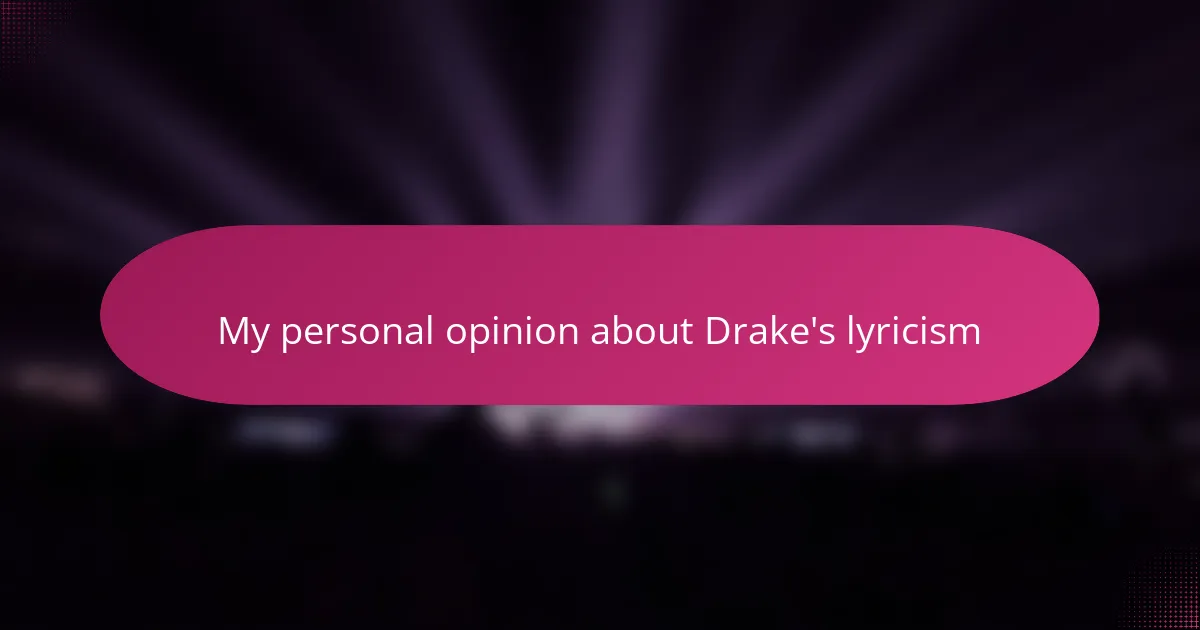Key takeaways
- Rap lyricism is a blend of storytelling, emotion, and cultural expression, requiring deep listening to appreciate its layers.
- Drake’s unique style combines vulnerability with confidence, using relatable language and compelling narratives that resonate with listeners.
- His impact on rap includes promoting emotional openness and accessibility, influencing other artists to blend introspection with catchy hooks.
- Applying Drake’s techniques involves embracing vulnerability, balancing simplicity with emotional complexity, and focusing on storytelling to create authentic connections.
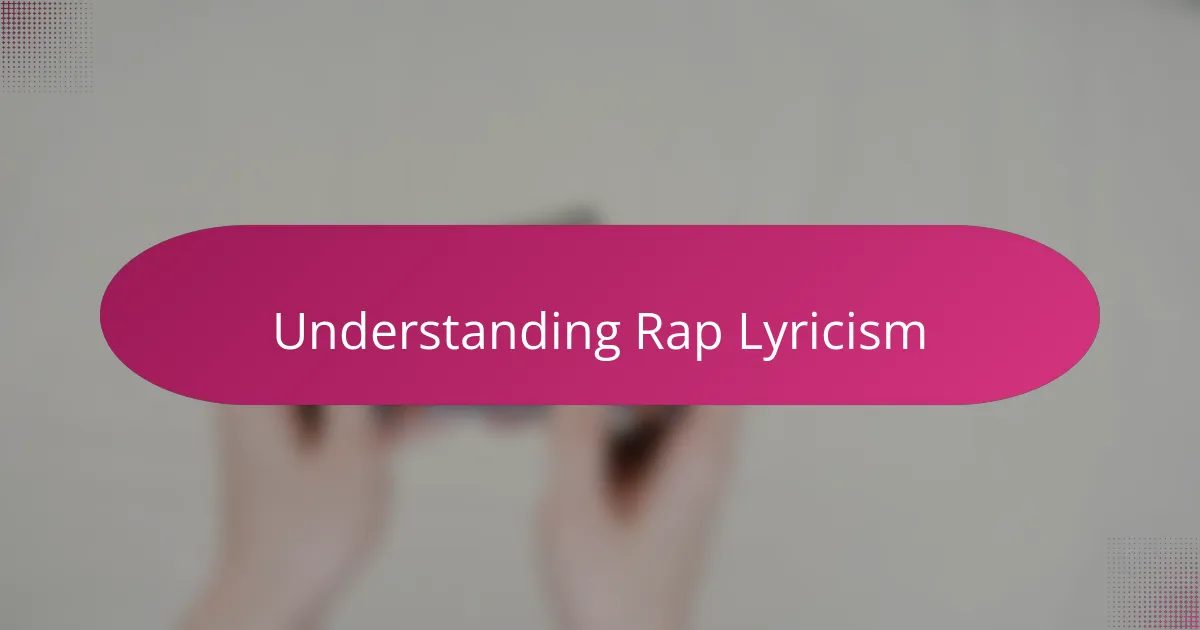
Understanding Rap Lyricism
When I first started diving into rap music, understanding lyricism felt like decoding a secret language. It’s not just about rhymes or clever wordplay; it’s about storytelling, emotion, and cultural expression all wrapped into one. Have you ever paused a song just to catch the layers beneath the beat? That’s where true lyricism comes alive for me.
Rap lyricism demands more than surface-level listening. It challenges you to listen closely—to the metaphors, the cadence, and the subtle shifts in tone. I remember times when a particular line struck me because it mirrored my own struggles or feelings, making the experience deeply personal and real.
What separates a good rapper from a great one, in my view, is the ability to weave vulnerability and confidence seamlessly through their words. Isn’t it fascinating how a few carefully chosen words can evoke such a powerful emotional response? Understanding lyrical depth opens up a new world in rap that goes far beyond catchy hooks.
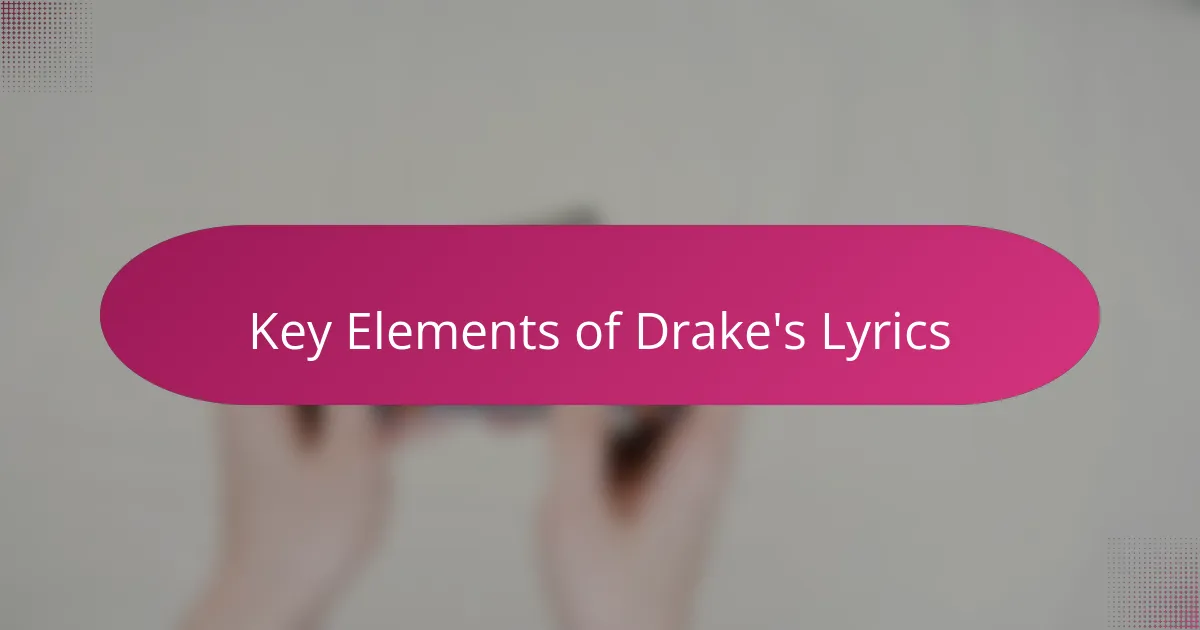
Key Elements of Drake’s Lyrics
Drake’s lyricism stands out to me because of his unique blend of introspection and bravado. He doesn’t just brag about success; he often reveals his vulnerabilities, which adds a layer of authenticity that many artists shy away from. Have you noticed how his lyrics often feel like a conversation—sometimes he’s confident, other times reflective, almost like he’s inviting you into his mind?
Another element that catches my attention is his use of catchy yet meaningful wordplay. It’s not just clever rhymes for the sake of sound; there’s often a double meaning or emotional weight behind his lines. This balance between accessibility and depth keeps me coming back, as I find new interpretations every time I listen.
Finally, Drake’s storytelling shines through his ability to capture complicated relationships and personal struggles with simple yet powerful language. I remember hearing a track where he articulated heartbreak in a way that felt so familiar, it was almost like he was voicing my own experiences. This connection makes his lyricism resonate on a deeply human level, beyond just the beats and hooks.
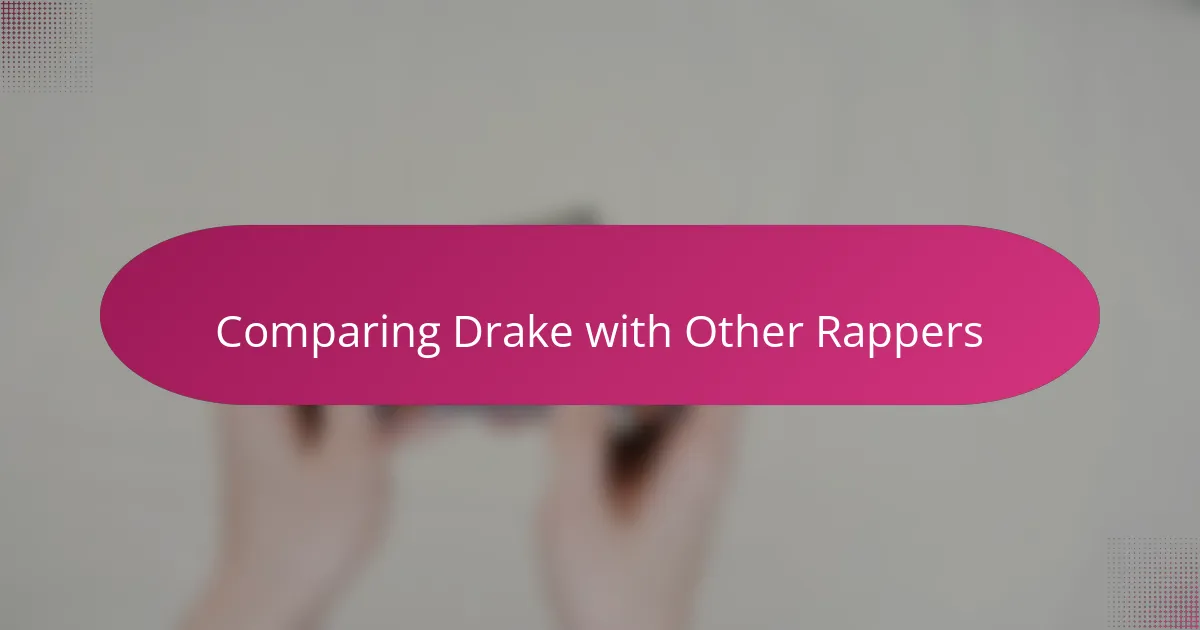
Comparing Drake with Other Rappers
When I compare Drake to other rappers, what strikes me is his unique blend of emotional openness and commercial appeal. Unlike some artists who prioritize complex wordplay or aggressive bravado, Drake mixes vulnerability with confidence in a way that feels genuine and relatable. Have you ever noticed how his lyrics can switch from self-assured to introspective within the same verse? That fluidity, to me, sets him apart.
On the other hand, some rappers excel with intricate metaphors and rapid-fire delivery that showcase their technical skill. While I appreciate that level of craftsmanship, I sometimes find their lyrics harder to connect with emotionally. Drake’s straightforward but layered storytelling feels like a personal chat rather than a performance, which makes his music feel more intimate to me.
I also think about how different artists approach themes like fame, love, and struggle. Does anyone else feel that Drake tackles these topics with a rare balance—sometimes vulnerable, sometimes boastful, but always honest? This duality keeps his work fresh and, honestly, more accessible than some of the more cryptic lyricism out there. It’s this blend that, for me, makes comparing him to other rappers a fascinating exercise.
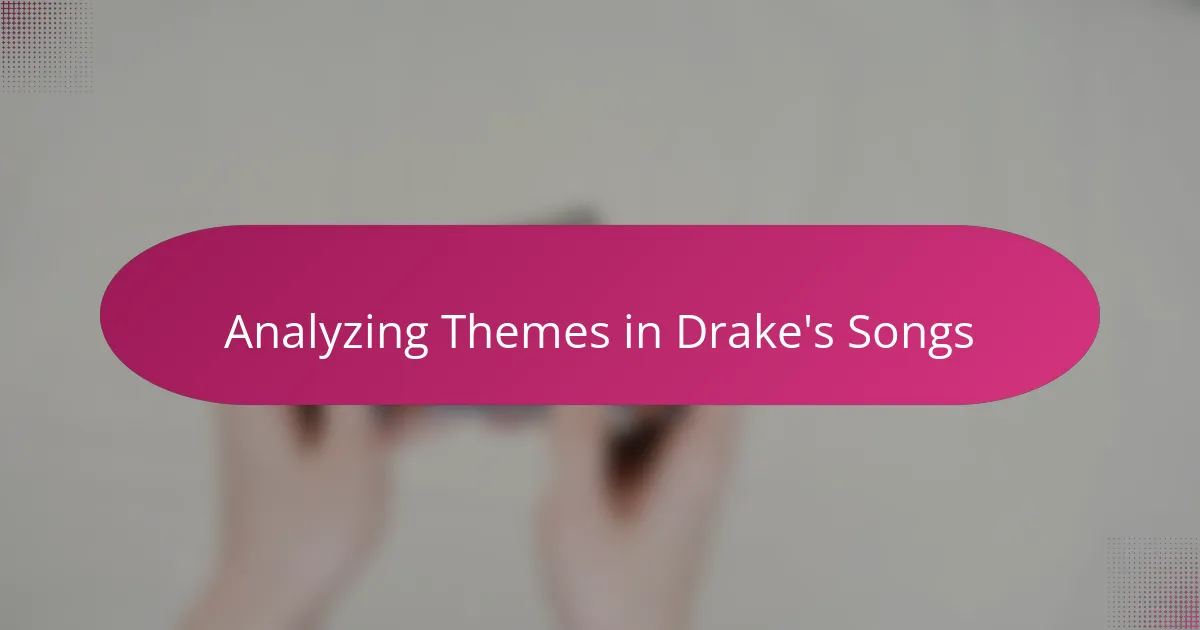
Analyzing Themes in Drake’s Songs
When I dig into the themes Drake explores, what stands out to me is his constant tug-of-war between fame and vulnerability. Have you ever caught yourself relating to a line where he’s both celebrating success and reflecting on loneliness? That duality feels so real—it’s like he’s sharing a diary entry set to a beat.
Another theme I often notice is Drake’s focus on complicated relationships. He captures the highs and lows with such raw honesty that it’s impossible not to feel what he’s feeling. I remember listening to a song where the emotions were so vivid, it brought back memories of my own messy love life, reminding me how universal those struggles really are.
Drake also weaves ambition and self-doubt throughout his lyrics, which I find incredibly humanizing. It’s refreshing to hear an artist admit to insecurities amid the bragging—it’s a balance that makes his songs resonate beyond just the surface level. Don’t you find it easier to connect with music that embraces imperfection rather than hides it?
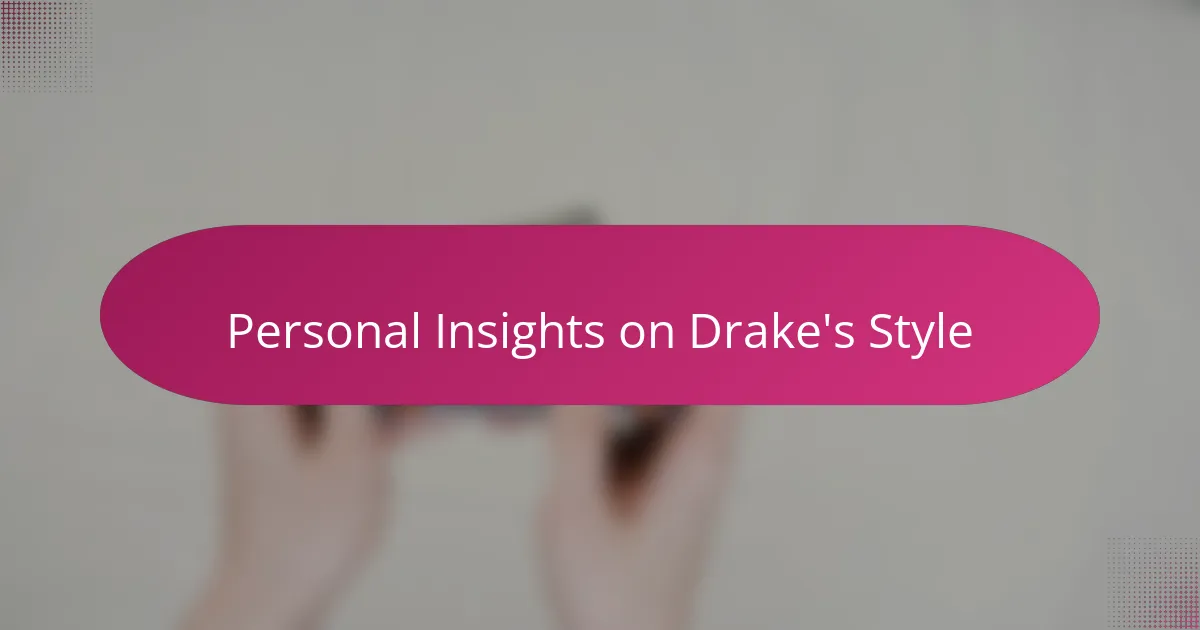
Personal Insights on Drake’s Style
Drake’s style feels like a personal letter sometimes—he invites you right into his thoughts, mixing confidence with moments of doubt. I remember hearing one of his tracks late at night and realizing how his voice carried an honesty that made me pause and reflect on my own experiences. Isn’t it rare for an artist to balance bravado with such vulnerability so effortlessly?
What I find particularly captivating is how he uses simple language but manages to pack it with so much emotional weight. It’s like he’s speaking directly to you without overcomplicating things. Have you ever caught yourself replaying a line because it felt like Drake was telling your story in just a few words?
At times, his lyricism feels like a conversation with an old friend who’s not afraid to share both their triumphs and insecurities. That duality makes his music feel relatable and real to me, and I can’t help but respect how he navigates this space, making his style genuinely unique in the rap game.
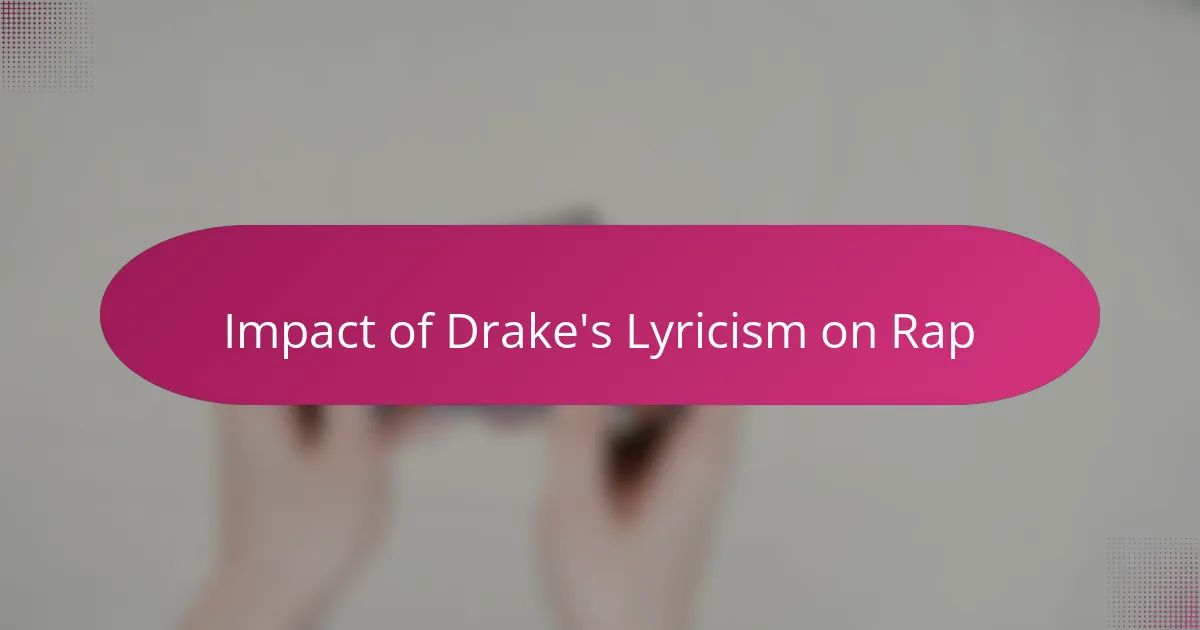
Impact of Drake’s Lyricism on Rap
Drake’s lyricism has, in my experience, reshaped how many rap artists approach vulnerability in their music. I often find myself thinking about how before him, it was rare to hear a mainstream rapper openly wrestle with self-doubt or emotional complexity. Doesn’t it feel like he created a space where honesty became a strength, not a weakness, in rap?
What’s striking to me is how Drake’s storytelling has influenced not just the content but the delivery style across the genre. Artists today seem more willing to blend melodic hooks with introspective verses, a shift I attribute largely to Drake’s trailblazing approach. I remember noticing this trend during one playlist shuffle—suddenly, rappers I followed were channeling that same mix of reflection and swagger that makes Drake’s work so compelling.
Beyond the style, Drake’s impact also lies in how he makes rap accessible without diluting its depth. Have you ever caught yourself playing a Drake song on repeat because each listen revealed a new layer of meaning? That’s a testament to his lyricism’s influence—it invites listeners to feel, analyze, and connect, expanding rap’s reach beyond traditional boundaries.
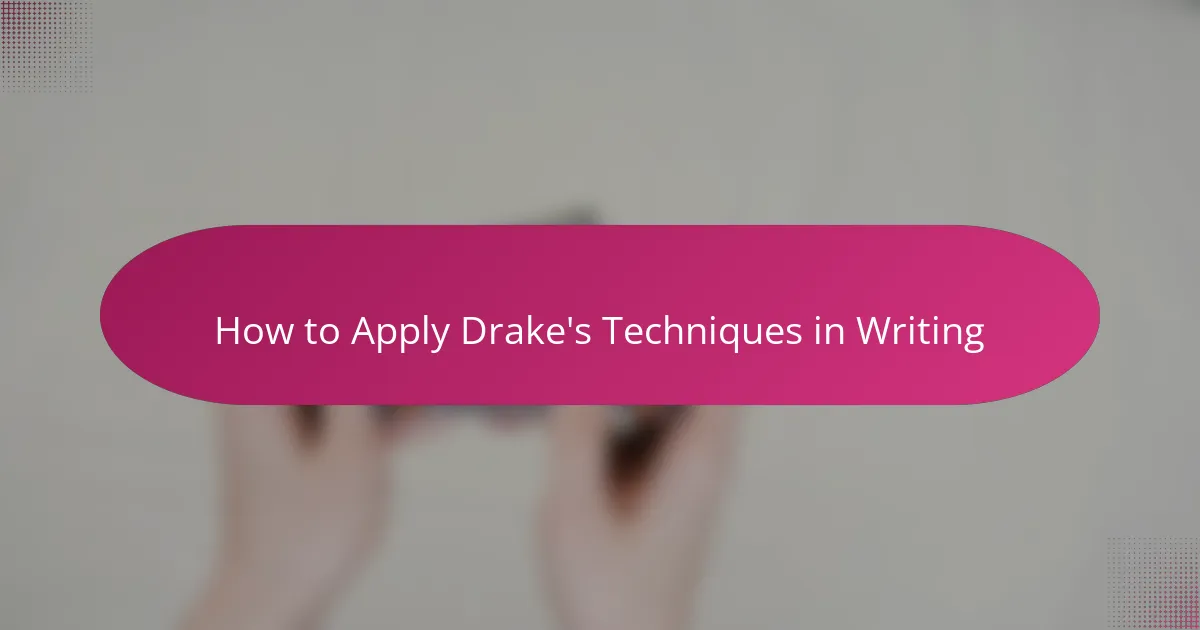
How to Apply Drake’s Techniques in Writing
To start applying Drake’s techniques in your writing, I often remind myself to embrace vulnerability alongside confidence. Have you ever tried writing a verse that feels like a personal confession but still packs that punch of swagger? When I do this, my lyrics gain a layer of authenticity that resonates more deeply.
Another trick I pick up from Drake is balancing simplicity with emotional complexity. Instead of overloading lines with complicated words, he chooses clear, relatable phrases that carry weight. I’ve noticed when I write this way, the message sticks better and invites listeners to connect on their own terms.
Finally, storytelling is key. Drake’s lyrics often unfold like intimate conversations or diary entries. I challenge myself to capture moments—whether they’re about love, ambition, or doubt—in a way that feels like I’m sharing a piece of my life. Doesn’t that approach make your writing feel more alive and real?
